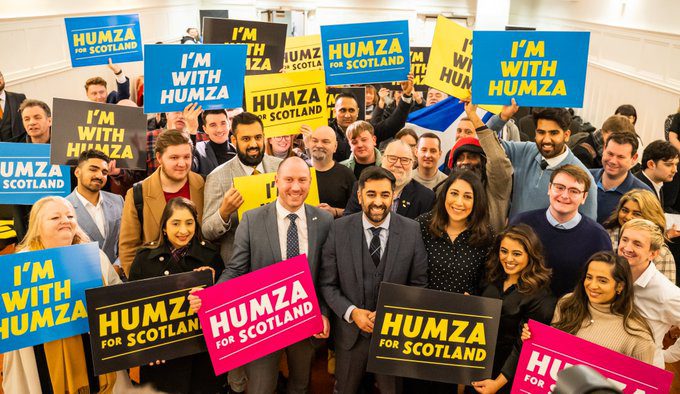
Humza Yousaf’s (front center) campaign launch event, February 20, 2023 (Twitter).
As Scottish First Minister Nicola Sturgeon announced her resignation earlier this month, she set the stage for the race for both the leadership of the SNP and Scotland. The most likely candidate to emerge might be Scottish Health Minister Humza Yousaf, who has apparent ties both to the Muslim Brotherhood and to other various extremist organizations.
For eight years, the Scottish National Party (SNP) was synonymous with Nicola Sturgeon’s name. However, her legacy will always be a divisive one, marked by (among other things) a continuous fight for a second independence referendum in the wake of Brexit, as well as controversial progressive policies such as transformative green initiatives or the infamous Gender Bill, which may have contributed to her eventual resignation.
Now, the SNP appears to be moving in an even more leftist direction under the future leadership of Humza Yousaf. The health minister was the first to announce his intention to enter the leadership contest and chances are he will win it comfortably after most other prominent members of the SNP turned down the opportunity. Instead, they have chosen to back Yousaf, believing that the party needs a “fresh perspective.” At the moment, the biggest challenger to Yousaf’s bid is Kate Forbes, the SNP’s young, more socially conservative finance secretary, albeit with considerably weaker prospects.
A huge decision to make, but with the support & love of my family, I have decided to put myself forward as a candidate to become Scotland's next First Minister, and Leader of the SNP.
— Humza Yousaf (@HumzaYousaf) February 18, 2023
See my video below for some of the reasons why I believe I am the right person for the job 👇 pic.twitter.com/aDbVUe568E
Yousaf appears as a charismatic leader in his campaign, promising dialogue, reconciliation, and unity in all issues moving forward, whether it be gender reforms or independence. But his past ties to Muslim extremists and his history of aiding them through government funds is part of a record he cannot escape.
Yousaf was always politically invested in issues relating to the Muslim community, as shown by the lengthy report from Focus on Western Islamism (FWI), published last week. FWI describes itself as an organization that “educates its readers about the threat posed by Islamism (and the efforts to counter it) in Western democracies.” The report states that in the late 2000s, while Yousaf was working as the personal aide to former SNP leader Alex Salmond, he was simultaneously leading the Scottish Islamic Foundation (SIF), partly funded by the Scottish government. In 2010, the SIF was classified as an “entry level Islamist group [contributing] to the threat of radicalization” by the Quilliam Foundation, a Muslim-run counter-extremism watchdog. Following the report, Scottish opposition parties even called for an investigation into the SNP’s decision to fund the SIF with over £400,000.
Humza Yousaf, who will likely become Scotland's next First Minister, is, at the very least, "Islamist adjacent," having brought extremists to meet with senior Scottish politicians.https://t.co/QsRl4DoIvc
— Focus on Western Islamism (@FWIslamism) February 23, 2023
In 2008, Yousaf brought three known Islamists to Edinburgh to meet with the Scottish Minister for External Affairs and Culture. The meeting, organized by SIF, involved a fugitive Hamas commander who later rose to the terror group’s political bureau; a leading member of the Muslim Brotherhood who reportedly praised Iraqi “resistance” against the British; and a representative of the Friends of Al Aqsa (FOA), a Hamas front posing as a British NGO, who had called for the killing of adulterers.
The Scottish Islamic Foundation was not the only one to gain financially from Yousaf’s involvement in the government. In 2013, as Minister for External Affairs, Yousaf announced £400,000 to Islamic Relief, one of the largest Muslim charities in the world. Islamic Relief was established by the Muslim Brotherhood and has been classified by a number of countries (including Israel, Switzerland, and the U.S.) as a terror group—or at least actively aiding one. In addition to giving funding to the organization, Yousaf also accepted to become their official “media spokesperson.”
It is unclear if Yousaf is still close to any of these organizations, or if he would continue this kind of activism once elected as party leader. Regardless, if he does become the next Scottish first minister, maintaining good relations with the Muslim community and carrying on with the SNP’s former progressive positions will not be easy. As a proponent of “progressive political Islam,” he may be the best choice for both Muslims and the woke. But is he the best choice for Scotland?
